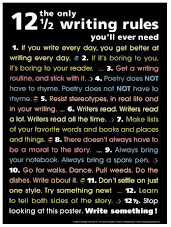SACRAMENTO, Calif. - I think I devised this plan when I shifted from working as a newspaper editor to university professor, more than 20 years ago.
In the news business, using your time wisely was rarely an issue - your deadlines made it so that you had to write and research as fast as you could, no matter what. And external (news) events dictated your schedule.
Today, as a university professor with a multiplicity of responsibilities (chair of the university Faculty Senate, freelance writer, teacher, boat owner and, and, and...) I see that the nine things on my 'to do' list could easily send me into a day of furtive motion, which likely would result in nothing getting completed.
So today, I am invoking what I call the '1-hour rule' for the items on the list: each will get one hour of attention, though it's clear that I won't need a full hour for some. At least I hope not.
During the one-hour, I focus just on that one thing - in this case, updating this blog and sending out an email to my magazine writing class, directing them here. If I get done before 8:15 a.m. Pacific Daylight Time, great. If not, I'll move on to something else, but I will have put in a solid hour. But, like the news business, I have a deadline to get this done and I can see as I type a little too slow that I better get moving quicker if I want to be able to cross this off the list.
What's amazing is how much can be accomplished in an hour, if that hour is spent solely on one thing. It means no checking email, no peeking to see what today's high temperature is going to be in Tenacatita Bay, no calling anyone on the telephone to chat, no going out in the backyard to see if the fruit trees are still growing...
It does include getting another cup of tea, however, because the caffeine helps get things cranking.
The 1-hour rule works well for me and the people I've convinced to use it, say it helps them focus. One item on today's list is clean the patio. If I do give it a full hour, the place will shine.
But I can't start thinking about that yet, I have this to complete - which it now is, in just about in 22 minutes.
What's next on that list?
Saturday, March 17, 2007
Thursday, March 01, 2007
The 'R' word is almost as verboten as the 'I' word
SACRAMENTO, Calif. - When professional writers get together and talk about research, they almost never utter the word, research.
That's because the word is so loaded with all kinds of other associations (people in lab coats squinting into microscopes, someone sitting in a huge pile of books and reports...) that it's inaccurate.
Certainly, there are times when journalists - and freelance writers - do research that requires stacks of books and reports, but most of what writers do is simply gather information in less formal ways. Writers spend much of time on the Internet, yakking on the telephone and, if possible, actually getting out and talking directly to people.
In my magazine writing class, I can see the eyes glazing over when I say "You need to do more research," so if catch the "R" word before it escapes, I revise it to say "You need to talk with more people and find some documents..."
If "research" is an inaccurate word for what writers do, so is the word "interview."
Interviews usually conjure up visions of boom microphones and the glare of stage lights - not what 99 percent of interviews really are: brief conversations.
When I call someone - or more frequently email - to ask a few questions, I say just that. "Can I ask you a few questions about...?" Or sometime I will say "Can we chat about...?"
It less threatening and very few people will say they don't have time to 'chat."
Consider the likely reactions to these inquiries:
Do you have time for me to interview you for the research I'm doing?
Do you have time to chat about a story I'm working on?
That's because the word is so loaded with all kinds of other associations (people in lab coats squinting into microscopes, someone sitting in a huge pile of books and reports...) that it's inaccurate.
Certainly, there are times when journalists - and freelance writers - do research that requires stacks of books and reports, but most of what writers do is simply gather information in less formal ways. Writers spend much of time on the Internet, yakking on the telephone and, if possible, actually getting out and talking directly to people.
In my magazine writing class, I can see the eyes glazing over when I say "You need to do more research," so if catch the "R" word before it escapes, I revise it to say "You need to talk with more people and find some documents..."
If "research" is an inaccurate word for what writers do, so is the word "interview."
Interviews usually conjure up visions of boom microphones and the glare of stage lights - not what 99 percent of interviews really are: brief conversations.
When I call someone - or more frequently email - to ask a few questions, I say just that. "Can I ask you a few questions about...?" Or sometime I will say "Can we chat about...?"
It less threatening and very few people will say they don't have time to 'chat."
Consider the likely reactions to these inquiries:
Do you have time for me to interview you for the research I'm doing?
Do you have time to chat about a story I'm working on?
Subscribe to:
Comments (Atom)














